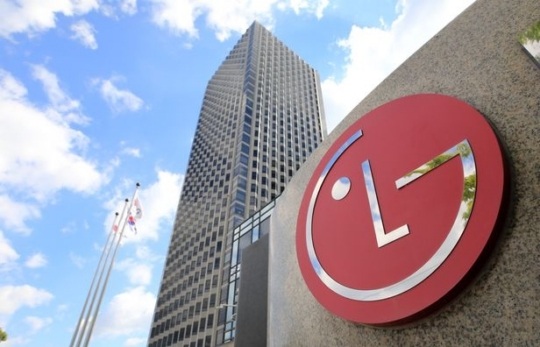 |
LG Electronics headquarters building in Yeouido, Seoul. (LG Electronics) |
Subscription services in the home appliances market are fast expanding in South Korea, with the country’s top players targeting younger and smaller households.
LG Electronics, the country's leading home appliance giant, has achieved a record sales figure surpassing the 1-trillion-won ($ 736 billion) mark for its subscription service, and Samsung Electronics is also reviewing to launch a similar service for its home appliances in the latter half of the year.
For 2023, LG Electronics reported its appliance subscription service recorded sales of 962.9 billion won, up 31 percent on-year. Adding the care service subscription -- regular cleaning and performance checkups service -- the revenue amounts to 1.13 trillion won. The figure accounts for about 20 percent of the company's home appliances sales, LG Electronics said.
Last September, the company reorganized its appliance rental service, which centered on small devices such as water purifiers, into a subscription service and expanded the appliances category to include TVs and refrigerators among others.
“The subscription service supplies the demand of customers who are burdened to buy pricey, large home appliances at once in the wake of high interest rates, and those who want to try out the devices,” Choi Ji-young, an LG Electronics official, said in a company interview in June.
“While our previous rental service was largely centered on the elderly, the subscription branding came to attract younger customers, particularly newlyweds and single household families."
Based on its experience of operating a rental business, the company said it sought to introduce a more diverse plan and benefits for the subscription service. More than 300 types of home appliances are subject to the subscription service, and the period of the subscription plans is more diverse, according to LG.
LG's subscription service is seen as one of the key factors contributing to its sales growth.
Samsung's home appliance unit posted sales of 6.88 trillion won in the second half of the year, down 3.6 percent on-year. LG, on the other hand, witnessed its home appliances sales grow by 10.6 percent, to 8.84 trillion won in the same period.
“We expect the revenue from our subscription service to continue to increase. Based on our experience in Korea, we are expanding the service in other countries including Malaysia, Taiwan and Thailand,” an LG official in charge of the home appliance unit said during an earnings call for the April-June period this year.
Seeing its crosstown rival achieve a remarkable feat in the subscription service, Samsung Electronics is also considering launching its own version in the second half of the year, according to industry sources.
The tech giant currently has a device care service for repairs, but does not operate any home appliance subscription service. The company did have a rental service that it operated in collaboration with SK Magic, a smaller home appliances firm that specializes in rentals, until last year. It halted the service this year following SK Magic's partial sell-off.
While Samsung did not confirm details of its plan to launch a home appliance subscription service, industry sources predict the new service would likely be introduced in September or October this year.
The company is also discussing with its financial and security affiliates, such as Samsung Fire & Marine Insurance, Samsung Card and S-1, to offer side benefits such as a settlement discount for customers using Samsung cards for their subscription, sources say.
"We are in the early stage of the discussion, so we have not yet settled on the product and service on which we will introduce the subscription service," a Samsung official said.
The home appliance subscription and rental service market in Korea is expected to grow to 100 trillion won in 2025, from 40 trillion won in 2020.





![[Herald Interview] How Gopizza got big in India](http://res.heraldm.com/phpwas/restmb_idxmake.php?idx=644&simg=/content/image/2024/11/20/20241120050057_0.jpg)

